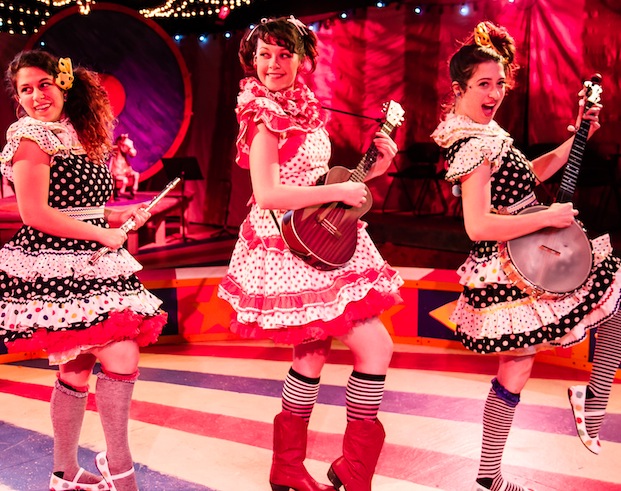Fuse Theater Review: The Hypocrites’ “Mikado” — A Theatrical Wow
Don’t miss the “joyous shout and ringing cheer” of this delightfully boisterous version of The Mikado.
The Hypocrites’ Mikado, a version of the Gilbert & Sullivan operetta, adapted and directed by Sean Graney. Co-directed by Thrisa Hodits. Music directed by Andra Velis Simon. Presented by the American Repertory Theater at Oberon, Cambridge, MA through April 5.

Dana Omar, Emily Casey, and Christine Stulik in the Chicago production of The Hypocrites’ “The Mikado.”
By Iris Fanger
The Hypocrites’ production of The Mikado is “as welcome as flowers that bloom in the spring,” to borrow a line from the venerable Gilbert & Sullivan operetta. However, this lively version is hardly the summer camp or grammar school performance of beloved memory for those of us who grew up during the mid-20th century hearing these songs. Nor does the staging reflect the staid, reverent traveling shows of Britain’s D’Oyly Carte company, which made Boston a regular stop on its frequent North American tours. Martyn Green became as famous in the United States as he was in England for scampering along the footlights, singing antic songs and dancing in the role of Ko-Ko, the Lord High Executioner.
The G & S operettas of the 1880s are now in public domain, fair game for revision, with no holds barred when it comes to frisky reinvention. Sean Graney, who grew up in Saugus and graduated from Emerson College, and is Founder and Artistic Director of the Chicago-based company The Hypocrites, has brought a marvelous sense of post-modern fun and imagination to The Mikado (and before that to Pirates of Penzance, which played in Cambridge in 2013). Graney believes in what he calls a “Theater of Honesty …through two elements..our actors shall employ a genuine emotional vulnerability..in presentation we shall acknowledge our presence in a theater and embrace high theatricality.” Those lofty statements would be suspect except that in performance the group lives up to them: the Hypocrites deliver a theatrical wow that not only breaks down the fourth wall between actors and audience but throws the bricks out of the house.
This Mikado takes place in a circus ring filled with rainbow-colored balloons that can be tossed in the actors’ faces or deflated with a satisfactory pop. The rim of the ring can be used for seating, at least until an actor taps a viewer on the shoulder asking him/her to move because the playing space is needed. The entire premises at Oberon is fair game. Indeed, I had to snatch away my purse when one character jumped on top of my table on the balcony to belt out his song.
Directed by Graney (co-directed by Thrisa Hodits), the performance is as inter-active as an evening in the theater gets, except that the members of the audience do not have voices as excellent as those of the actors, although many people were singing along. Nor are the viewers called upon to play an instrument as the actors do, ranging from accordion, flute, violin, a bank of guitars and banjos, saxophone, and trombone. There’s a rattling pair of spoons and a washboard as well. Music director Andra Belis Simon deserves high marks; somehow, no matter how wildly the actors prance, noodle, or dance around, she manages to fully respect Sir Arthur Sullivan’s melodies and W. S. Gilbert’s pre-rap, patter lyrics, which are delivered with careful attention to getting the diction right.
The ten actors in the cast are dressed like clowns or mice with tails. Two masters of ceremonies rule the Big Top, Ko-Ko (Rob McLean) and Pooh-Bah, Lord High Everything (Matt Kahler). Shawn Pfautsch doubles as the determined Nanki-Poo, the wandering minstrel (and son of the Mikado in disguise) and also as the ugly Katisha, a battle-axe in full bosom and old-lady clothes who expects to marry the heir to the throne. The lovely Emily Casey, as his adored Yum-Yum, has a splendid soprano voice; the actress also takes on the role of The Mikado when he/she appears in appropriate pomp and circumstance. Casey, sporting a false mustache, plays a trombone when she is the Mikado. As Yum-Yum she performs with violin and guitar to stop the show in her solo “The Sun Whose Rays Are All Ablaze.”
There’s barely a mention or picture of Japan, the original G & S setting for the operetta. Despite protests over the years aimed at the show’s offensive portrayals of the Japanese, be assured that G & S were satirizing their lunk-headed fellow Brits, not Asians. If you can snag a ticket for one of the remaining performances this weekend (limited availability), don’t miss the “joyous shout and ringing cheer” of this show—and bring along the kids.
Iris Fanger is a theater and dance critic based in Boston. She has written reviews and feature articles for the Boston Herald, Boston Phoenix, Christian Science Monitor, New York Times, and Patriot Ledger as well as for Dance Magazine and Dancing Times (London).
Former director of the Harvard Summer Dance Center, 1977-1995, she has taught at Lesley Graduate School and Tufts University, as well as Harvard and M.I.T. She received the 2005 Dance Champion Award from the Boston Dance Alliance and in 2008, the Outstanding Career Achievement Award from the Graduate School of Arts and Sciences at Tufts. She lectures widely on dance and theater history.

I took my mother, visiting on a holiday weekend, and she loved it, so kids and grandparents were equally enthralled. But Iris needn’t have mentioned that G&S weren’t satirizing literal Japanese; The Hypocrites clarified the confusion by singing “if you want to know who we are/we are citizens of this land.” In the world of the Silly, we all enjoy occasional citizenship.